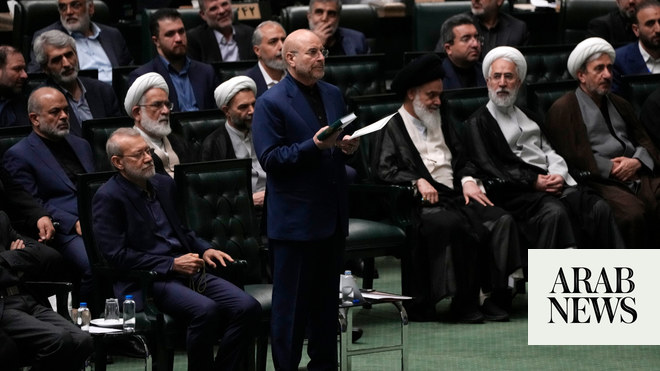
The 128-seat assembly voted 98 in favor of Berri, with 29 blank ballots and one that was annulled.
The re-election of Nabih Berri, a Shiite ally of the Iran-backed Hezbollah group who has held the post since 1992, reflects Lebanon’s entrenched sectarian-based political system, which has held despite rising discontent.
BEIRUT: Lebanese lawmakers overwhelmingly re-elected the country’s longtime Parliament speaker to the post on Wednesday, giving the 80-year-old monopoly of the office for three decades now.
The re-election of Nabih Berri, a Shiite ally of the Iran-backed Hezbollah group who has held the post since 1992, reflects Lebanon’s entrenched sectarian-based political system, which has held despite rising discontent.
The 128-seat assembly voted 98 in favor of Berri, with 29 blank ballots and one that was annulled. The newly elected Parliament convened Wednesday for the first time after May 6 nationwide balloting. It’s Berri’s sixth consecutive term; he ran unchallenged.
The country’s first parliamentary elections in nine years ended years of political stalemate over a new election law and repeated extension of the Parliament’s terms. Hezbollah and its political allies scored significant gains in those elections.
Outgoing Prime Minister Saad Hariri called Berri a “national symbol.” The oldest member of Parliament, 86-year-old Michel Murr commended Berri for successfully managing the country’s sectarian politics over the years, preventing conflict.
“I extend my sincere thanks, for the sixth time, to the members of Parliament for their confidence in renewing my responsibilities as Parliament speaker,” Berri said, addressing the assembly following the vote.
Keeping on Berri as Parliament speaker is expected to smooth the way for the formation of a new government in the coming weeks. Like the outgoing Cabinet, it’s also likely to be a unity government that incorporates Hezbollah members.
Lebanon’s President Michel Aoun, a Christian, is now expected to begin consultations with lawmakers about a prime minister-designate and Parliament majority leader Hariri, a Sunni, is tipped to yet again head the government.
That Berri faced no challengers, and rarely has over the years, owes much to Lebanon’s sectarian-based and elite-dominated political system, which has mostly kept the peace since the 1975-1990 civil war, but has also spawned political paralysis and endemic corruption.
Berri is seen by some as an embodiment of that system, which shows no signs of changing despite rising discontent. But the Parliament speaker, who is one of Lebanon’s most influential and enduring politicians, is also seen as a moderate, unifying figure who lifted his Shiite community’s profile and role in the country’s postwar politics, often acting as mediator among feuding Lebanese factions.
Celebratory gunfire and firecrackers erupted across southern Beirut after Berri was approved. A pro-Syrian member of Parliament, Elie Firzli, was re-elected as his deputy.
Lebanon’s political system, built to distribute power among its various sects, mandates a Christian president, a Sunni prime minister and a Shiite Parliament speaker, while the Cabinet and Parliament seats are equally divided between Muslims and Christians.
As leader of the Shiite Amal movement, which is closely allied with the powerful Hezbollah, Berri is virtually untouchable. The two parties hold all but one of the 27 seats allotted to Shiites in Parliament.
A lawyer by training, Berri won power as a militia leader during the 1975-1990 civil war and transitioned to politics as the war ended.
His career since has mirrored the Shiite community’s steadily rising clout in a country where it had long been marginalized both economically and politically.
He has nimbly navigated shifting tides over the past three decades to seal both his popularity in the Shiite community and his grip on the post of speaker.
Even as he fashioned himself into a mediator among Lebanon’s deeply divided political factions, he has remained firmly allied to Hezbollah.
That partnership is likely to remain intact. In an AFP interview shortly after this month’s election, Berri said the triumvirate of “the army, the people, the resistance (Hezbollah)” was key to keeping Lebanon safe.
Like many Lebanese from the south, Berri’s parents moved to Africa to make a better living. He was born on Jan. 28, 1938, in Freetown, Sierra Leone. He earned a law degree from the state-run Lebanese University in 1963 before completing post-graduate law studies at the Sorbonne in Paris.
During Lebanon’s war, he rose to prominence by taking over the leadership of the Amal movement in 1980, two years after the mysterious disappearance in Libya of its founder, Imam Mussa Sadr.
In 1984, he led his militiamen in an uprising against the US- and Israeli-backed regime of President Amin Gemayel. Between 1985 and 1988, he helped crush supporters of Palestinian leader Yasser Arafat in the so-called “war of the camps.”
In 1988, his militia fought a deadly power struggle with Hezbollah, which took control of almost all the Shiite southern suburbs of Beirut and swathes of Lebanon’s Shiite-dominated south.
Amal continued to fight against Israel’s occupation of southern Lebanon until the latter withdrew in 2000.
“I am proud of my participation in the resistance against Israel,” Berri told AFP in an earlier interview. “But the rest (of the war) could have been avoided.”
Like many of Lebanon’s war-time chiefs, Berri transitioned to politics when the frontlines calmed, making himself an indispensable ally to Syria, which kept its troops in Lebanon.
Berri was named minister several times between 1984 and 1992. That year, in the first elections after the war ended, Berri was simultaneously elected a member and speaker of Parliament — the highest post for a Shiite in the country’s sectarian political system.











